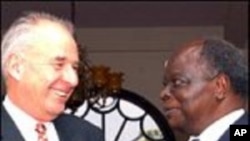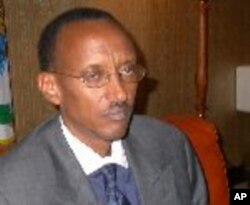Commonwealth Heads of Government ended their meeting Sunday in the Trinidad and Tobago capital of Port of Spain with an agreement for poor countries to get special funding to cope with the impact of climate change ahead of next month's UN Climate Conference in the Danish capital of Copenhagen.
African Union Chairman Jean Ping said last September that Africa will request “polluting countries” to finance the transfer and implementation of climate adaptation technology in Africa.
“We reached two broad conclusions: One there’s a political will to see an agreement to emulate in Copenhagen. And secondly, it talks about financing for the most vulnerable states to have access to the funding and technology necessary to reduce their carbon footprint and to make their countries carbon neutral,” said Eduardo del Buey, chief spokesman for the Commonwealth Secretariat.
Del Buey said the Commonwealth Port of Spain Declaration is in line with Africa’s demand for “polluting countries” to finance the transfer and implementation of climate adaptation technology in Africa
“If you read the communiqué on climate change, it says we welcome the initiative to establish, as part of a comprehensive agreement, a Copenhagen Launch Fund starting in 2010 and building to a level of resources of $10 billion annually by 2012,” Del Buey said.
The Commonwealth leaders agreed that an equitable governance structure to manage the financial and technological support be put place.
Del Buey said the Port of Spain Declaration sets the tune for next month’s Copenhagen conference on climate change.
The leaders also agreed to admit Rwanda into the Commonwealth as the second member without direct British colonial connection.
“Mozambique was a formal Portuguese colony, but it joined in the 1995, I believe. They made application and the leaders decided to admit Rwanda. It’s a decision that leaders take,” Del Buey said.
Del Buey said normally there is supposed to be some kind of constitutional or special ties to be a new member of the Commonwealth.
He said Rwanda met the ‘special ties’ requirement by virtue of it being a member of the East African Community which members Uganda, Kenya, Tanzania are also members of the Commonwealth.
Some Commonwealth leaders also reportedly raised concern about Uganda’s proposed draconian anti-homosexuality bill.
Del Buey said those leaders made their concerns known to the Ugandan government.
“Homosexuality is a question on which there is no Commonwealth consensus. But any kind of discrimination and persecution goes against Commonwealth values,” he said.
Del Buey said although the question of homosexuality is a complex one, all Commonwealth member states are required to behave in a way that is in line with international humanitarian law.
He said the issue Uganda’s anti-homosexuality bill has been turned over to the Commonwealth Ministerial Action Group responsible for reviewing the enforcement of Commonwealth values.





